
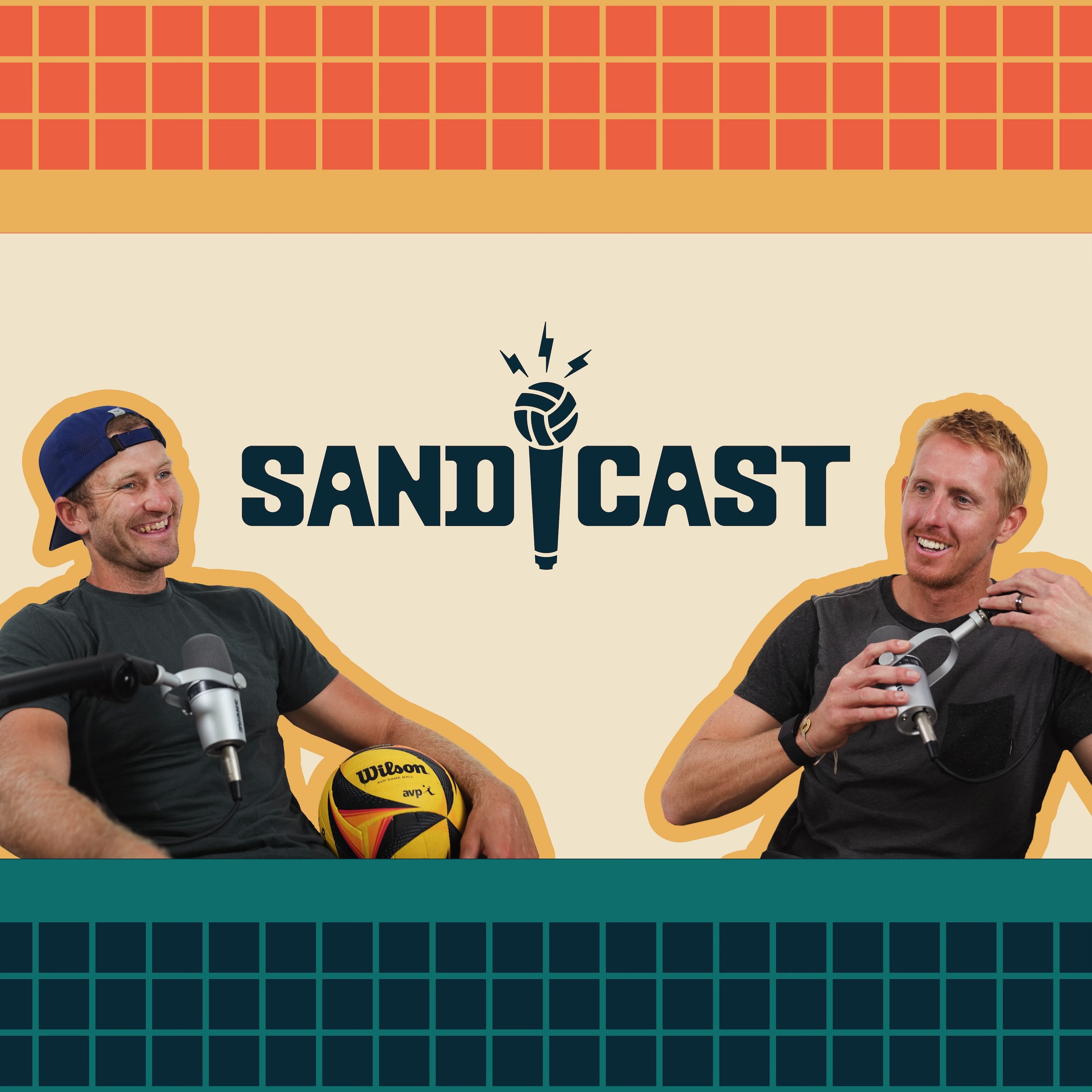
1.1M
Downloads
465
Episodes
SANDCAST is the first and leading beach volleyball podcast in the world. Hosts Tri Bourne and Travis Mewhirter take listeners into the world of the AVP, Volleyball World Beach Pro Tour and any other professional beach volleyball outlets, digging deep into the lives of the players both on and off the court as well as all of the top influencers in the game.
Episodes
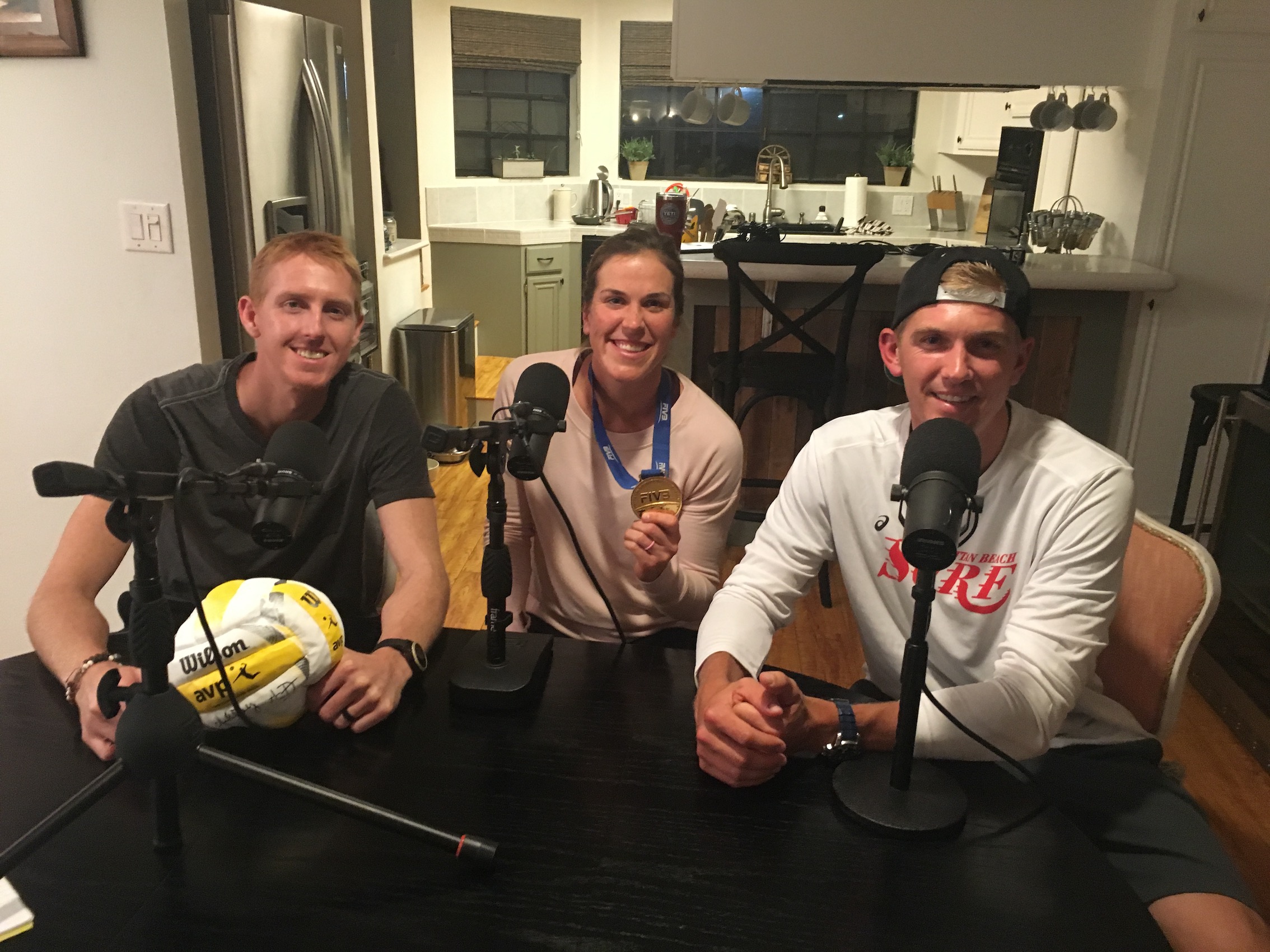
Wednesday Feb 14, 2018
From Australia with gold, with Avery Drost and Amanda Dowdy
Wednesday Feb 14, 2018
Wednesday Feb 14, 2018
Contrary to popular belief, the first gold medal of the winter was not, in fact, won by 17-year-old snowboarder Red Gerard, who snatched the slopestyle gold medal in the 2018 Olympic Games from Canadian Max Parrot.
The initial golds of the month were not even won in PyeongChang, but in Shepparton, Australia, on a beach, and not in the perversely intriguing snow volleyball, which is currently an exhibition event for the Winter Olympics. The first went to Amanda Dowdy – one of two guests this week on SANDCAST: Beach Volleyball with Tri Bourne and Travis Mewhirter – and Irene Pollock, who won five straight matches, the last three of which went the full three sets. Shortly after, Avery Drost – Dowdy’s partner on SANDCAST – and Chase Frishman, playing in their first international event together, claimed a gold of their own, making for the first gold medal sweep of the winter season, soon to be followed by American snowboarders in the halfpipe and slopestyle in the PyeongChang Games.
“I’m so happy,” Drost said afterwards. “They’re a great team. They play a fun style of volleyball. It was our privilege to play against them, in Australia. To be doing this with Ledge here, who’s become like a brother to me – I love this guy, and just so humbled by this moment, with this guy, with you guys, it’s so wonderful.”
Yes, it is wonderful. And, for Drost, entirely unexpected. He had written off the one-star events for the obvious reason: They’re entirely, financially speaking, unfeasible.
“I remember looking at the star system when it first came out and breaking it down and thinking these one-stars don’t make sense,” said Drost, who split 1,000 with Frishman, as did Pollock and Dowdy. “Financially it doesn’t add up. Points are great but this is kind of ridiculousness when it comes to finances.”
The NORCECA path seemed more doable, though the continental tour is notoriously mercurial, known for cancelling events last second. Then again, as Drost said: “There’s not an abundance of doing things other ways.”
So there was this: world tour competition, available points, far less of a chance of an abrupt cancellation. And, of course, Australia.
“There are worse places to go,” Drost said.
Indeed, and Dowdy and Pollock actually one-upped their male counterparts in that department, hitting New Zealand’s tour for an event prior to claiming the top of the podium in Australia. It underscores a slight difference between the goals for the two teams: Pollock and Dowdy are looking for points, yes, as are all teams seeking the climb the international ladder, but perhaps more than that, they just want to play some ball.
“The more I can play the better it is for me,” said Dowdy, a 27-year-old who set the all-time kills record as a four-year starter at Texas Tech. “We see it as opportunity. We’re trying to climb that ladder and it’s more of a sacrifice right now because it’s not great financially, I’m not going to sugarcoat that. For us, we’re using it as opportunity. You can only control what you can control, that’s the position we’re in. We’re trying to close that gap.”
And the gap is beginning to close, much faster than they could have anticipated. The points boost they received pushed them into the country quota in the Fort Lauderdale Major. It’s a position some teams justifiably loathe, but to Pollock and Dowdy it was a welcome surprise. They had initially planned on potentially playing in four-stars in April. In a matter of five matches, they’re in a position to compete in a five-star in February.
“That just goes to show how important these smaller tournaments are,” Dowdy said. “We got that opportunity a lot sooner than we thought we would.”
And a gold medal before the rest of Team USA’s winter athletes.
GIVEAWAY: Our first Wilson giveaway will be a SIGNED WILSON VOLLEYBALL BY AVERY DROST AND AMANDA DOWDY. To enter, follow us on Instagram, @sandcast_podcast and comment with your FAVORITE QUOTE from any SANDCAST episode. Tri and Travis will select the winner based on their favorite quote from the comments.
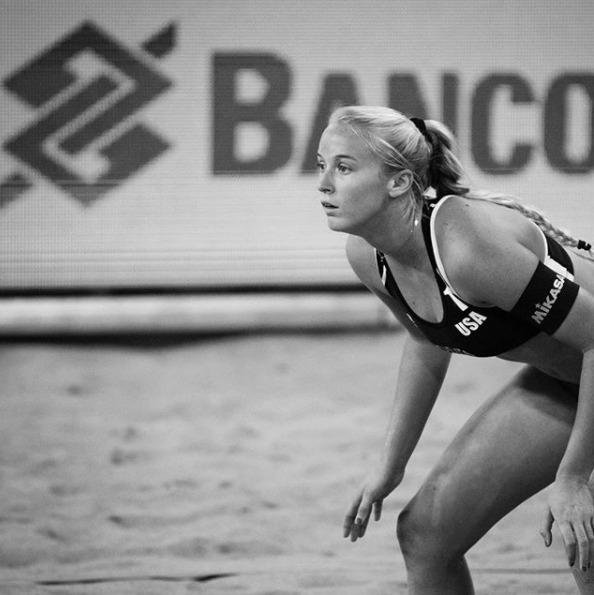
Wednesday Jan 31, 2018
Sara Hughes: Beach volleyball's next top role model, part 2
Wednesday Jan 31, 2018
Wednesday Jan 31, 2018
Perhaps you needed proof. Proof that Sara Hughes is, indeed, the one to fit the headline of this very podcast: That she is fit to become the next face of beach volleyball.
Had you stopped by Huntington Beach last Friday morning, you’d have had all the proof you’d need.
There, on court one, was Hughes, this week’s repeat guest on SANDCAST: Beach Volleyball with Tri Bourne and Travis Mewhirter, and partner Kelly Claes. There was coach Jose Loiola and mentor Misty May-Treanor. There was Ben Vaught and Tanner Woods, because, yes, Hughes and Claes train with professional men on occasion.
And there, lining the court was a dozen or so girls, member of the Long Beach City beach volleyball team, watching, studying, looking on.
Taking notes on Hughes.
Yes, they were at the Huntington Beach Pier that day because they had practice – but a Long Beach-based team doesn’t necessarily need to come to Huntington Beach to practice. There were there because that’s where May-Treanor, the director of beach volleyball operations at LBC, was, and May-Treanor was there because, well, Hughes.
There’s a reason Hughes and Claes have landed one Hall of Famer (Loiola) and another who could go down as one of the greatest talents in volleyball history as their coaches. It could be argued – and it often is – that Hughes and Claes, both 22 years old, have more potential than any individual or team in the world, more, even, than the precocious Duda, the 19-year-old Brazilian star and 2016 FIVB Rookie of the Year.
Already, Hughes and Claes have won an AVP, the 2017 season-finale in Chicago. Already they have reached FIVB quarterfinals and landed some of the game’s top names as sponsors.
Already they have broken previous goals and established new ones.
In their first season as professionals, breaking pool in international play was the goal. In their first event, a four-star in Rio, they finished fifth. Now, in just one season as full-time professionals, and a truncated one at that, seeing as they had to miss the early season events while they wrapped up what figures to be the most dominant college run for quite some time, Hughes and Claes see anything less than a podium finish as a shortcoming.
Finishes, though, are but one tangible measurement for the success of Hughes and Claes. There is no barometer through which to measure their “inspiration” to the next generation of beach volleyball players.
For now, you can see it yourself, right there, on the sidelines of court one, watching, observing, taking notes – figuring out ways to become the Next Sara Hughes.
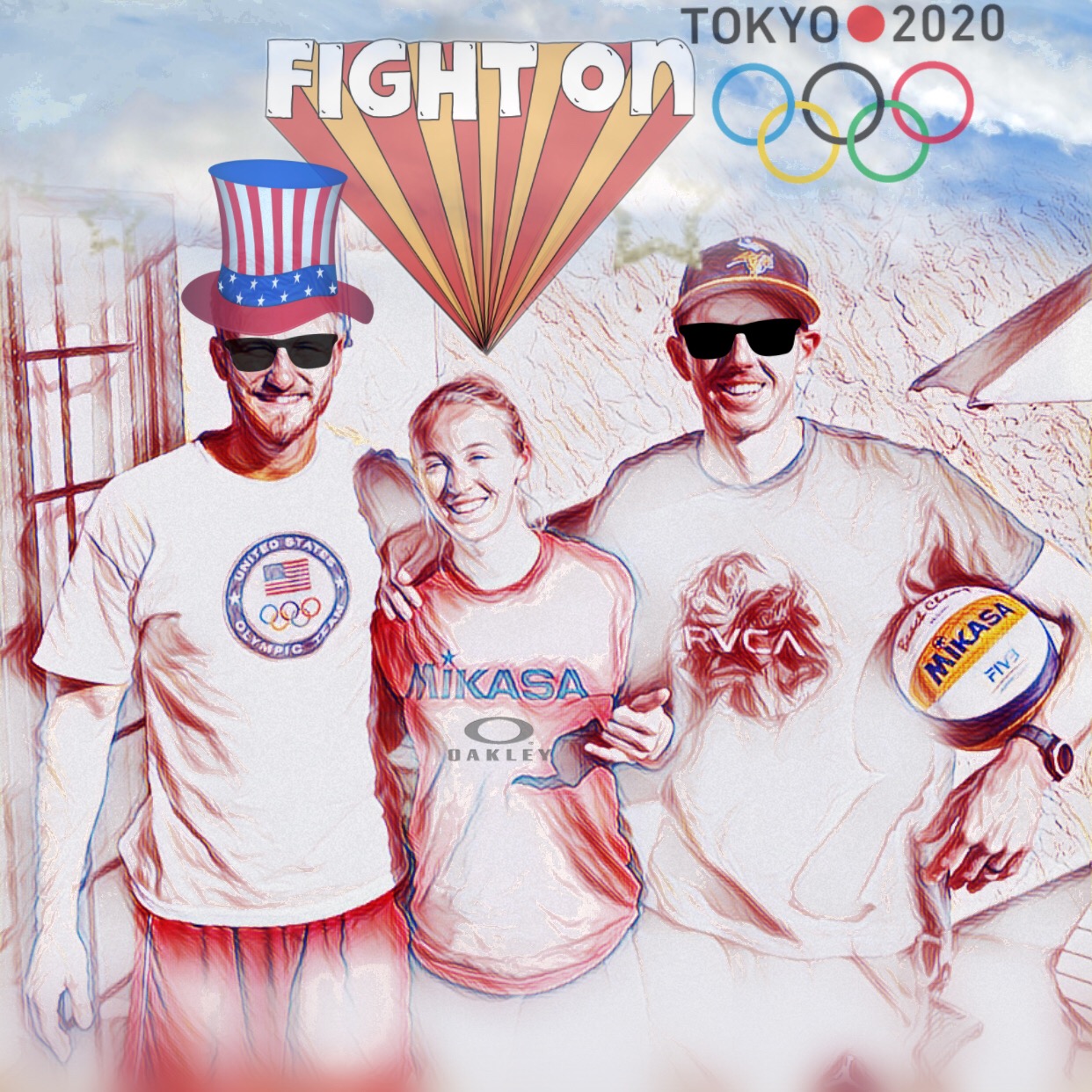
Wednesday Jan 24, 2018
Sara Hughes: Beach volleyball's next top role model, part 1
Wednesday Jan 24, 2018
Wednesday Jan 24, 2018
On one of the walls in Sara Hughes’ bedroom is a poster of Misty May-Treanor. It’s been there since she was little, when Hughes began getting into volleyball, serving as a reminder of what she might become one day should she continue to pursue this beach volleyball dream of hers.
So it struck her when, during a tournament this season, a parent of a young fan approached her and told Hughes that, on one of the walls in her daughter’s bedroom, is a poster of Hughes.
“I was like ‘No way that’s actually happening,’” Hughes recalled on SANDCAST: Beach Volleyball with Tri Bourne and Travis Mewhirter. “I am so grateful for that and I hope I can keep being a person young people can look up to for a long time and thank you to everyone who does.”
Did you catch that, at the end? Hughes thanked the fans for looking up to her, not the other way around. In an era where celebrities grow more and more closed off, taking instead to social media to communicate behind iPhones and laptops, Hughes remains open, willing to talk to anyone, pepper with anyone, give back any way she can.
“I’m always just trying to help people,” she said. “If anybody wants to ask, just come up to me, you can ask me directly.”
No different than May-Treanor continues to treat her.
When her age could still be measured with a single digit, Hughes would head down to the Huntington Beach Pier and sit on the wall, waiting for a chance, any chance, to simply shag balls for May-Treanor. Sometimes May-Treanor would let her pepper or hop in for a drill or two, creating an indelible memory that Hughes will cherish more than likely the rest of her life.
“I love talking to people and I love talking to young girls because I don’t think I’d be in the position I am today if I didn’t have the coaches I had and people like Misty May taking the time to talk to me,” she said. “I love doing the same to everyone else.”
She’s a sponsor’s dream, Hughes. She has the looks – blonde hair, blue eyes, Colgate smile – the smarts – she’s currently on a one-year track to earn her Master’s degree, just a year after delivering a graduation speech at USC – the media savvy, the talent, a voracious competitive drive juxtaposed with a disarmingly charming personality.
Oh, yes. She has earned this position, the right to have Mikasa run her through photo shoots and turn those shoots into posters for young girls to hang on their walls, to point to each night and morning and say “I want to be like that.”
Her accolades at USC could fill a small book’s worth of pages, and it’s a wonder if some of her records – four consecutive national titles, a winning streak that eclipsed 100 matches, a perfect 48-0 junior season, four-time All-American – will ever be broken.
Justifiably, this drew no small amount of media coverage, and while she was appreciative – always thanking anyone for taking the time and interest in her – it drove her a bit insane, how those reporters would invariably walk right past her exceptionally talented teammates. On the occasion that the media showed interest in the rest of USC’s indomitable team, more often than not they’d ask questions not about how their match went, but what they thought about Sara and her partner, Kelly Claes.
“I hated that when it was just ‘Oh! Sara and Kelly and Team USC!’” Hughes said. “I was like ‘No, you don’t realize, these girls who are on [teams] two, three, four, to the eighth team, they’re our support system. We would not be close to being good or successful without our teammates. They deserve just as much fame and respect as we do because we’re out there on the same hot court at USC and we’re training, every day, together.”
Her teammates, as she said, were plenty talented, and a number of them – Nicolette Martin, Terese Cannon, Jenna Belton, Sophie Bukovic, Allie Wheeler, to name a few – have already begun making a name for themselves on the AVP Tour.
Yet Hughes, as May-Treanor was, will be the name fans point to as the next in this massive wave of beach volleyball talent rising from the college ranks. She will be the one on the posters, and in the commercials for Oakley and KT Tape and Mikasa and any other sponsor wise enough to sign her.
She’s becoming the next generation’s version of May-Treanor – the one everyone looks up to – quicker than she could have possibly realized.
The final question of SANDCAST is reserved for the athletes to discuss anything else they’d like to discuss, anything the hosts may have missed. Most demur, maybe shout out a sponsor or two, thank us for the time.
Hughes, instead, had a message for her fans: “For the young players and any parents who are listening, I love the indoor game and the beach game, of course. So a lot of players are making this decision where they love the indoor but they have to play the beach in college because they think that’s the only thing they can play. I just think it’s huge for young girls to play both if they love both.”
You can teach any volleyball skill there is. But to become the next face of a sport, as May-Treanor once was?
That’s a trait passed down, from one legend to the one who might just become the next.
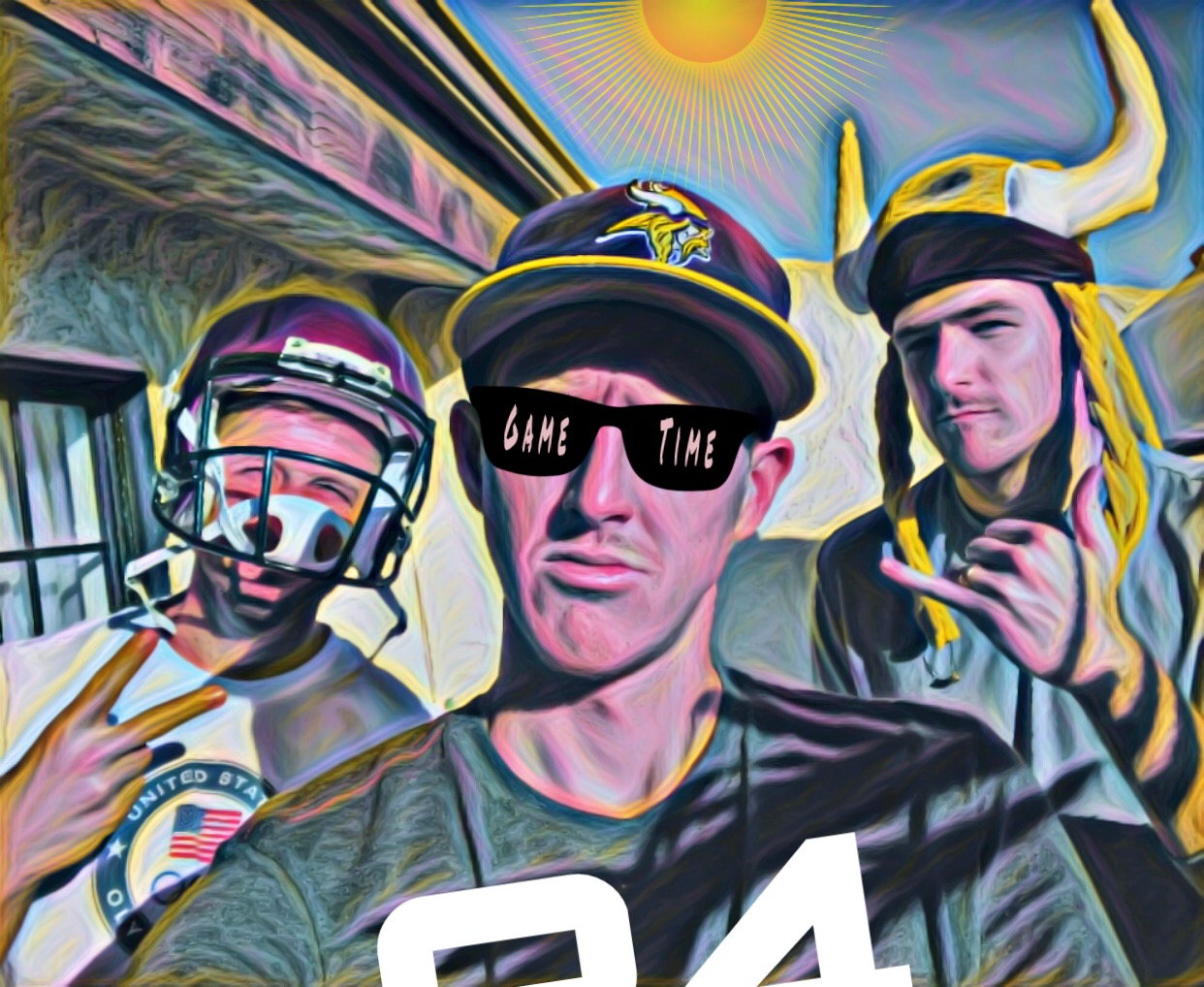
Monday Jan 22, 2018
BONUS: Bourne is (almost) back on the beach, with Murphy Troy
Monday Jan 22, 2018
Monday Jan 22, 2018

Wednesday Jan 17, 2018
SANDCAST No. 12: Talkin' sh** with Trevor Crabb
Wednesday Jan 17, 2018
Wednesday Jan 17, 2018
If you didn’t get to the Hermosa Beach Pier early on July 22, you would have been too late. There would have been no seats left, nowhere for you to watch the first clash of the Crabbs, Taylor and Trevor, brothers and former partners turned, it seemed, bitter rivals.
This wasn’t even the final – that would be a day later. This was the quarters, an oft-ignored round, one normally you’d sit and watch should you be there but not one to schedule your day around. And, yet, of course, this was no ordinary quarterfinal. This was a can’t miss match, on a Saturday.
The reason can be effectively summarized in two words: Trevor Crabb.
***
You may not like Trevor. You may love him. There’s a better chance you’re in one camp or the other, and not in the gray area in between, which is as much a societal trend as it is one regarding the elder of the Crabb brothers.
He likes that it’s quite possible he’s in a similar – relatively speaking – popularity category as Tom Brady and LeBron James, who are, paradoxically, both the most liked and disliked players in their respective leagues. He digs how much attention his verbal digs get – sand-throwing fools and goggle-wearing fools and a hungover fool.
His mouth has earned him almost daily jabs on social media from Ty Loomis (the sand throwing fool) and the on-court animosity of his brother, Taylor (the hungover fool), who reserves stare downs across the net almost exclusively for Trevor. Maddison McKibbin was at his most vocal when he and Loomis played Trevor and Sean Rosenthal in Hermosa Beach on July 21. It wasn’t much of a match, with Crabb and Rosenthal winning 21-16, 21-13, and yet the interest in it never waned, so close were the possibilities for explosions.
Thanks, in large part, to the fuses that Crabb had lit.
He did not invent trash talk on the beach.
But Crabb has done what we can to revive it in what has been a largely amicable half-decade for the AVP under Donald Sun.
He still laughs at the attention it gets, because when you think about it, what, in the wide scheme of sporting trash talk, has Trevor Crabb really done? He called Loomis a sand-throwing fool, though Loomis is the first to take immense pride in his quirky celebrations, in which he is, indeed, making himself as sandy as possible, either by showering himself with it or rolling in it. Crabb called Slick a goggle-wearing fool, and indeed, Slick does wear military-grade goggles to shield his eyes. Taylor Crabb’s hard-partying ways are hardly breaking news.
All three give it right back, too. Most of this is good-natured. Some of it flirts with the line of needling and perhaps a bit too far. He’s not altogether concerned either way.
“That’s what makes it fun,” Crabb said on SANDCAST: Beach Volleyball with Tri Bourne and Travis Mewhirter.
His most notorious rub is with Reid Priddy, a four-time indoor Olympian who, in his first year full-time on the beach, made the semifinals of the Manhattan Beach Open, where he met Crabb and Rosenthal. Crabb blocked Priddy early, and by Crabb’s accounting of the event, he waved for the crowd – and particularly to Rosie’s Raiders – to grow louder. Priddy, according to Crabb, told him to try to block the next one with his eyes open.
Crabb says he told Priddy to go back to indoor.
Some have said Crabb went further, that he made things personal. On SANDCAST, Crabb shrugged it off and said that was basically that.
Either way, when the match ended, there was an icy standoff between the two. The beach volleyball world subsequently lost its collective mind, and had you been following it purely on social media, you might have thought they brawled instead of played.
They simply walked opposite directions.
It’s a wonder what the reaction would have been to a player like, say, Kent Steffes, or Tim Hovland or Steve Obradovich, some of the sharpest, brashest trash talkers the game has known, bastions of a bygone era.
In 1992, three years after Crabb was born, Steffes, who remains one of the most well-known American beach volleyball players, told the Los Angeles Times that "I'd been taught aggressive, loud-mouthed, obnoxious volleyball. You try to humiliate the other team because they're trying to humiliate you. I didn't go out to win, I went out to destroy."
And, much to the delight of beach volleyball fans – and there were tens of thousands of them back then – that in your face style made for some provocative matches, on the court and off. Later that year, Steffes had Randy Stoklos running so hot that Stoklos followed him to his hotel after a match and they nearly came to blows. Steffes told the New York Times the next day that "you know why Randy and I got in that fight? Because I blocked him at 13-all to break open the game, 14-13. And I went, 'Yeahhhh.' And I turned around and high-fived Karch. And he thought I shouldn't cheer when I blocked him, that he'd been involved in the sport for so long, he'd played for 10 years, that I ought to respect him enough not to cheer when I block him. Have you ever heard anything so asinine in your life?"
Sound familiar?
In 1996, when Steffes was informed that Stoklos had twisted his ankle and wouldn’t be anywhere close to 100 percent for their Olympic trial match the next day, the one to qualify for Atlanta, he shrugged and deadpanned: “Good. I hope it’s broken.”
That was volleyball then – loud, merciless, unapologetic.
“Anything goes,” Sinjin Smith told the Los Angeles Times in 1994. “Yelling, screaming, fighting – and all of it happened. In any given match, it was pretty crazy. And very, very entertaining to the public. Players would end up going into the crowd and actually mixing it up with the crowd and each other. You just don't see that today."
It wasn’t only reserved for the bad boys. No, even Karch Kiraly, the G.O.A.T, the golden boy, one of the most likable humans there is, took swipes at Smith prior to the 1996 Olympic Games. He told the press that Smith, who was nearing 40, might need a wheelchair to be brought out on center court. He lashed out at – and has since apologized to – Carl Henkel, Smith’s partner in the 1996 Olympics, too.
“Every time Karch had a microphone he was badmouthing Sinjin,” Henkel told me last winter, during an interview for a beach volleyball book.
Karch Kiraly? Bad mouthing?
Are Crabb’s antics all that different?
Perhaps the beach volleyball world has become a bit sensitive. Crabb’s volume of trash talk pales in comparison to the Golden State Warriors’ Draymond Green, whose prodigious mouth earns him technical fouls and fines by the month. And besides, Crabb’s never intentionally kicked someone in the nuts. It pales in comparison to the Redskins’ Josh Norman, or former Viking great Randy Moss.
Heck, even Jordan Spieth will mix it up on the PGA Tour.
Perhaps you’d like Crabb to shut up. Just play volleyball. Maybe win a tournament before chiding those who have, like Taylor or Loomis or McKibbin or Slick.
But you cannot deny this: When Trevor plays, you’re going to watch.
You’re going to listen.
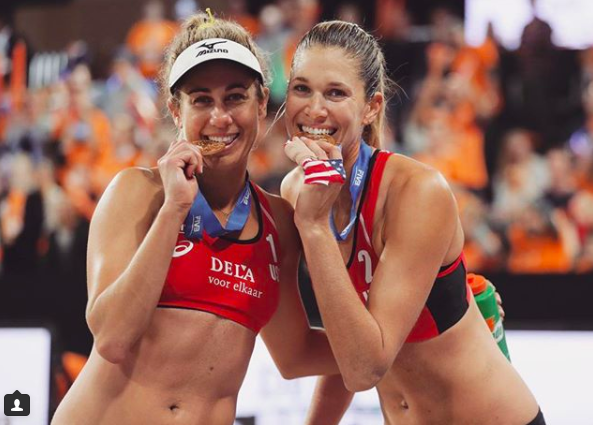
Monday Jan 08, 2018
SANDCAST BONUS EPISODE: Breaking down The Hague with Trevor Crabb
Monday Jan 08, 2018
Monday Jan 08, 2018
The 2018 beach volleyball season is, remarkably, upon us. In a way, at least.
The FIVB kicked off the 2018 year in the very first week of the year, hosting an indoor beach tournament at The Hague, a four-star event to open the season, hauling in a variety of new partnerships and unfamiliar faces.
One of those new partnerships, of course, was that of April Ross and Alix Klineman, who took the longest road possible, battling through a pair of country quota matches, two more in the qualifier, and then running off six straight-set wins in the main draw to claim gold, beating Brazil’s Maria Antonelli and Carolina Salgado – another team that came out of the qualifier – in the finals.
“I’m going to be riding high on this win for awhile and this week in The Hague was a blast,” Ross wrote on Instagram afterwards. “Pretty excited or this journey.”
It was Klineman’s first international beach tournament, though far from her first time on a big stage, having played on both the Brazil and Italian indoor leagues.
As for the rest of the U.S. teams, though, it wasn’t quite the start to the year many would have desired.
Sara Hughes and Kelly Claes finished ninth, while Brooke Sweat and Summer Ross took a 17th and Lauren Fendrick and Karissa Cook finished 25th. The men didn’t fare much better, with the new partnership of Billy Allen and Ryan Doherty claiming the highest finish of American teams at ninth. Casey Patterson and Stafford Slick and Miles Evans and Billy Kolinske both finished 17th.
"It was definitely a little weird overall," said Trevor Crabb, who failed to make it out of the qualifier, on SANDCAST: Beach Volleyball with Tri Bourne and Travis Mewhirter. "Me and [Sean Rosenthal] pretty much decided we won't practice together before we left for the trip because I went back to Hawaii for the offseason and pre-season for six weeks, doing some training there, and I'm not exactly sure how much training he was doing. It was so early in the year, it's the end of off-season and beginning of pre-season, and it affected us for sure."
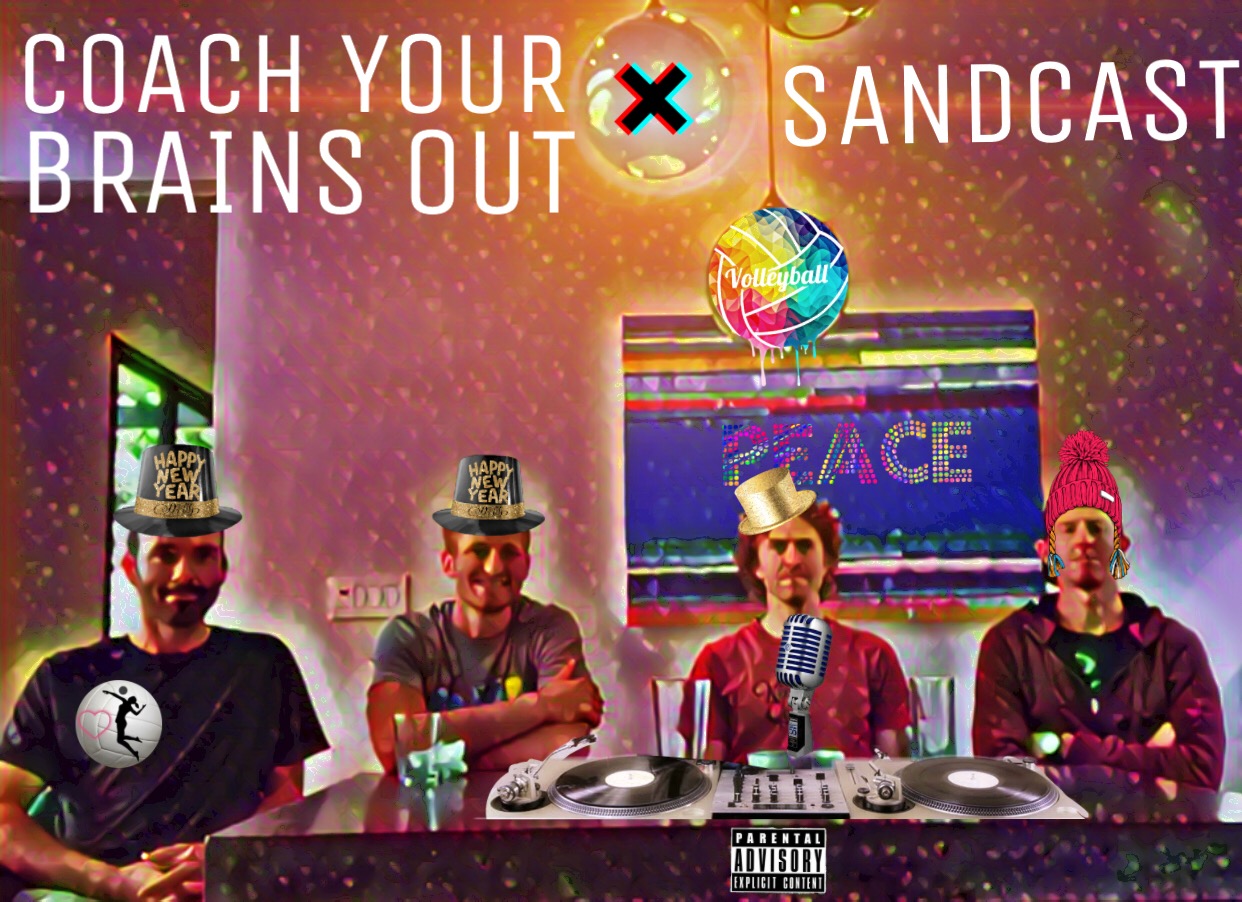
Wednesday Jan 03, 2018
SANDCAST Your Brains Out with Billy Allen and John Mayer, Part 1
Wednesday Jan 03, 2018
Wednesday Jan 03, 2018
Much to the disappointment of the listeners of Coach Your Brains Out and SANDCAST: Beach Volleyball with Tri Bourne and Travis Mewhirter, there will be no Anchorman-esc battle between the two podcasts.
We’re now on the same team.
That’s right. VolleyballMag.com is now the distributor for both podcasts, which are as similar as they are different, both focusing on the same sport while diving into it in vastly dichotomous angles.
Coach Your Brains Out began as many podcasts do: A few friends with a similar interest, an iPhone, and a bit of editing know-how. John Mayer, Billy Allen and Nils Nielsen put an iPhone on a table and just talked about whatever volleyball and coaching topics came to mind. Allen would edit, they’d post, and, as they joke frequently on the show, maybe a few people would even listen.
They enjoyed doing it. Soon, they realized more than a few actually enjoyed listening. The show expanded in every way a podcast could. The audience grew, the technology evolved from one iPhone to a few mics. Guests have been some of the top performers in their respective spaces, including the likes of volleyball legends Phil Dalhausser and Karch Kiraly, authors Joshua Medcalf and James Kerr, and coaches John Kessel and Tom Black, among dozens of others.
It isn’t just coaching they analyze, but traits and features of high performing individuals and teams, digging into the various recipes for greatness, both physiological and psychological.
“Around the time we were starting it we were turned on to ideas like Train Ugly’s website, a lot of ideas like motor learning and different ways to teach the game,” Allen said. “That was a lot of what sparked our first couple episode and we were fired up on that. Before we did the podcast it was fun to pick [John’s] brain and just talk, that kind of stuff, and now we’re still able to do that and get some great coaches from around the world too.”
“We try to find people striving for mastery in whatever they do,” Mayer added. “Whatever ways we can find to be our best.”
Coach Your Brains Out publishes on Thursdays, typically in 30-minute episodes.
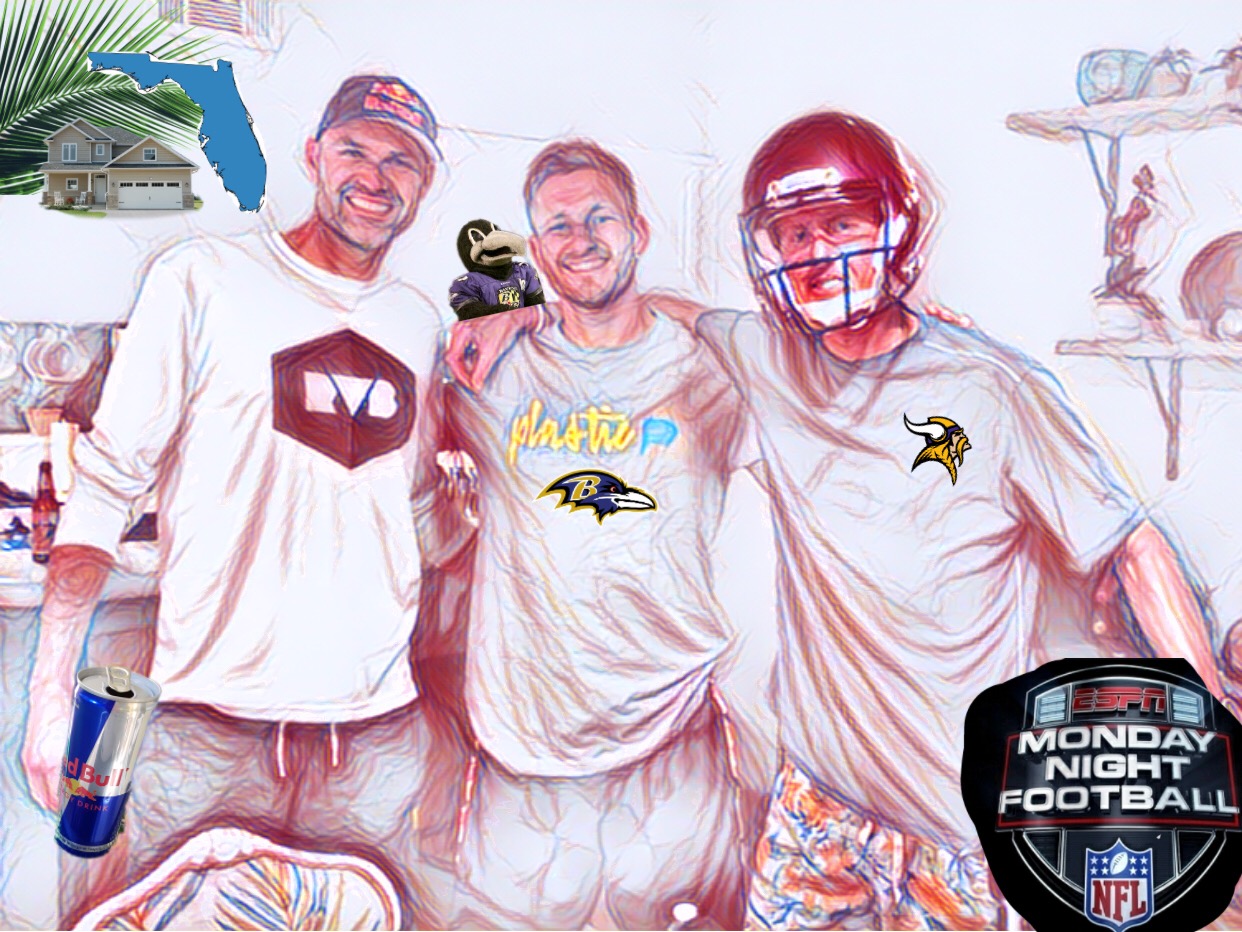
Wednesday Dec 20, 2017
SANDCAST No. 8: Phil Dalhausser has another mountain to climb
Wednesday Dec 20, 2017
Wednesday Dec 20, 2017
There is little that Phil Dalhausser has yet to accomplish in beach volleyball. He’s won more than 50 tournaments domestically and another 30-plus internationally. He’s won an Olympic gold medal and owns the longest active win streak on the FIVB Tour, having won a tournament in each of the past 12 years. But the 37-year-old Dalhausser isn’t finished. Not yet.
He has a Defensive Player of the Year to win. Just kidding. Maybe.
You’ll recall that Dalhausser did make the finals in the AVP’s season finale in Chicago split-blocking with Nick Lucena, and the one award that the Thin Beast has yet to win in his lavishly long list of awards is a Defensive Player of the Year.
“If I could play with Evandro [of Brazil], we could just sit back and bomb serves and whatever, if we dig a ball it’s a bonus,” Dalhausser said on SANDCAST: Beach Volleyball with Tri Bourne and Travis Mewhirter. “And playing behind Evandro would be a lot easier than playing behind Nick.”
He’s joking, though it speaks to Dalhausser’s brilliant career that he is devoid of just one accolade, for a position he doesn’t play. He has no plans – “no shot” – to split-block (Chicago is likely a one-time ordeal), for Dalhausser does indeed still have mountains to climb.
He wants a World Championship. He wants another Olympic gold in Tokyo 2020.
But first, he’s bidding farewell to California. Dalhausser and his family are packing up and moving to Orlando, just a few hours from Lucena in Tallahassee.
“It’s a little bit of risk as far as volleyball goes,” he said on SANDCAST. “There will definitely be a transition.”
A transition back to their roots. Dalhausser and Lucena have been close for more than a decade, having met playing against one another in Florida, when Dalhausser was at Central Florida and Lucena at Florida State.
Their respective journeys have taken them from northwest Florida to South Carolina to Southern California and now, for the final act of their decorated careers, back home.
“I’d like to grab the 2019 World Champs and 2020 Olympic gold,” Dalhausser said. “That’s the goal. We’ll see what happens.”
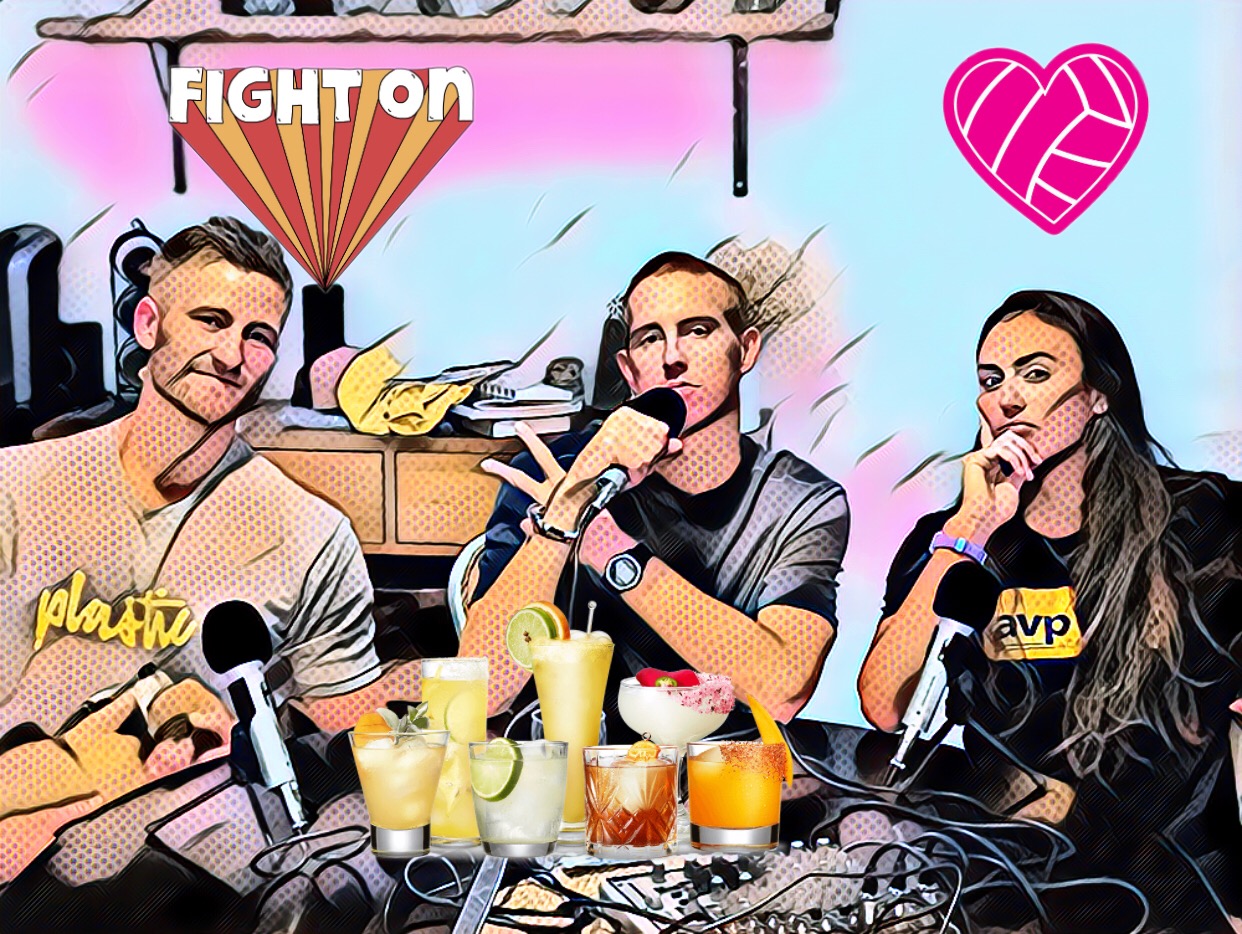
Wednesday Dec 13, 2017
SANDCAST No. 7: Geena Urango, the intern who dug her way to the top
Wednesday Dec 13, 2017
Wednesday Dec 13, 2017
Geena Urango didn’t expect to be playing on the AVP Tour. After playing volleyball for five years at USC – four indoors, one on the beach – Urango, who studied digital marketing, was just stoked to have a job: Interning with the AVP Tour.
“My first day on the job I get called into Donald [Sun’s] office just to do a little meet and greet,” Urango recalled on SANDCAST: Beach Volleyball with Tri Bourne and Travis Mewhirter. “He’s like ‘Yeah, so you’re going to play too, right?’ And I was like ‘What?’ I didn’t even know that was an option.
“Just that one sentence sparked it.”
That question was both a blessing and a burden for Sun, who was able to retain Urango for a year and a half before Urango ultimately realized that she still had a passion for the game, to the point that she quit her job with the AVP to focus full-time on her career as a player.
Her decision has proved to be prescient. Since concentrating on beach – she still freelances as a marketer – Urango has become one of the top defenders on the AVP Tour, making four finals over the course of the 2015, ’16, and ’17 seasons with partner Angela Bensend. It was a partnership that began on a last-minute scramble prior to the 2015 Manhattan Beach Open and has since become one of the most recognizable on Tour, both for their play, their nickname – “TexMex” – and garish bikinis, kudos of Goldsheep.
“Benny and I, what was great about playing together, we were always on the same page, what our goals were for the season,” Urango said. “Each season we progressively got better and better, so it was ‘Why break what’s not broken?’ We had a great balance. She was fiery and brought a lot of energy and I was more calm and collected.”
Bensend, however, has since moved to Philadelphia, and with a balky back her future on the beach is uncertain, leaving Urango one of the more talented free agents on Tour.
For now, Urango is content traveling the world, snowboarding, spoiling her dogs.
Find our full show notes at VolleyballMag.com.
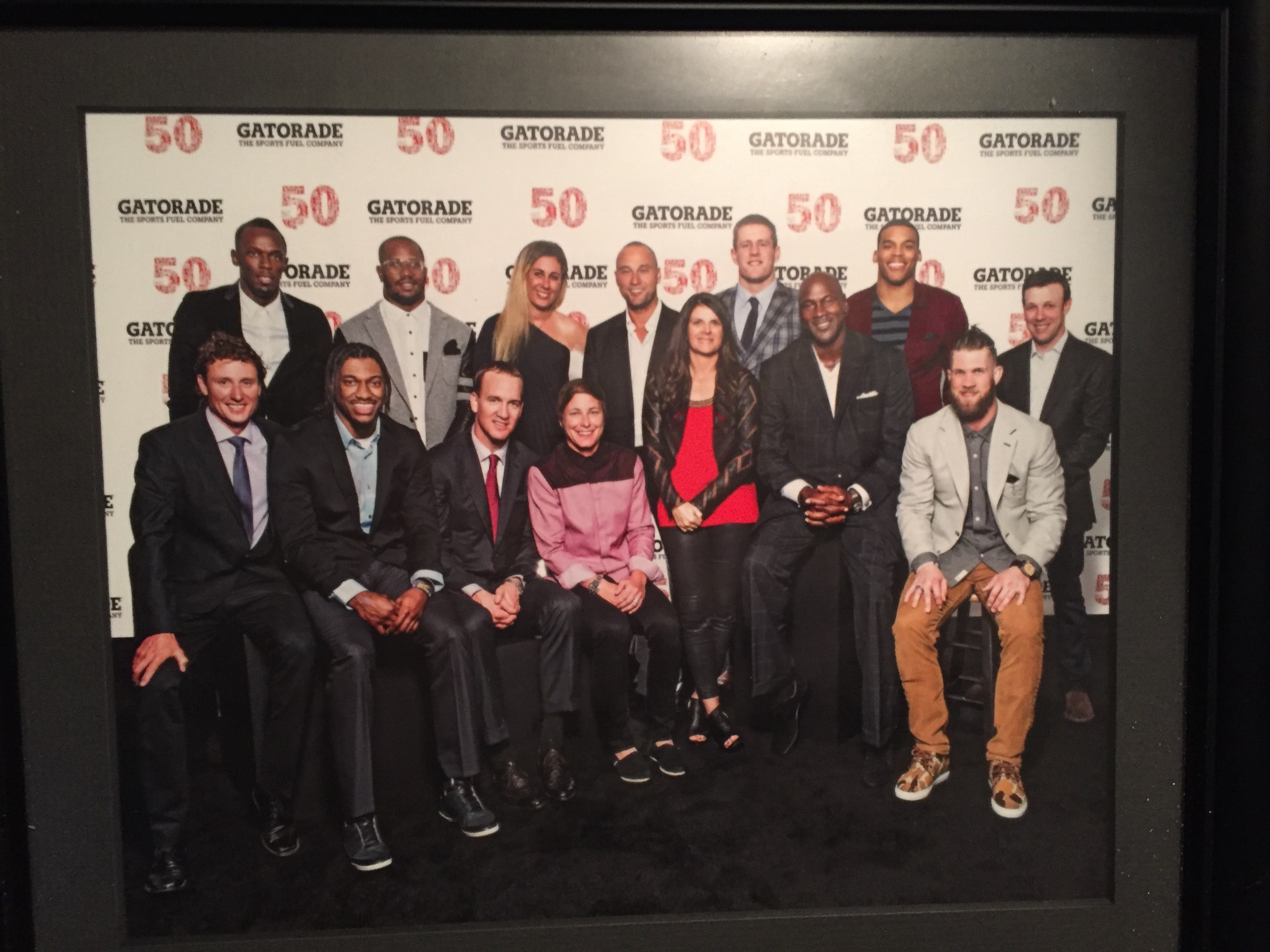
Wednesday Dec 06, 2017
SANDCAST No. 6: A glimpse into greatness with April Ross, Part 2
Wednesday Dec 06, 2017
Wednesday Dec 06, 2017
The cat’s out of the bag: April Ross is playing with Alix Klineman, a 6-foot-5 blocker out of Stanford.
On paper, the two will be a formidable pair, Ross one of the best defenders in the world, Klineman a standout indoor blocker who has an AVP final and a third under her belt. One problem: Klineman has just one year of full-time beach experience. The road to Tokyo 2020 will not be easy, though as Ross says on SANDCAST: Beach Volleyball with Tri Bourne and Travis Mewhirter, “it’s not supposed to be easy.”
“What is the meaning if what you’re doing if you’re not being challenged?” she says. “If you don’t have these things that will help you grow and things to help you overcome, what’s the point?”
On Part Two, Ross discusses the path ahead, the inevitable challenges ahead, her mindset moving forward, as well as pairing up with former partner Jen Kessy, who will be coaching Ross-Klineman through Tokyo, site of the 2020 Olympic Games. Ross and Kessy, of course, are one of the best teams in American beach volleyball history, medaling in 17 out of 20 FIVB tournaments in a stretch from 2008-2010, finishing with a silver medal in the 2012 Olympic Games in London, where they lost to Kerri Walsh and Misty May.
Few, if any, in the game know Ross’ style better than Kessy.
“One of the things I learned the importance of,” she said, “is building a like-minded team around yourself: having the same mentality, the same goals, the same work ethic are all really important. Alix and I don’t know each other very well but it’s funny how connected we feel.”
The first glimpse the beach volleyball world will have of Ross-Klineman will be in The Hague on January 3, where Ross, who has won 21 international tournaments, will likely be in a country quota.
“We’re training every day,” Ross said. “Doing everything we can to get better every day.”